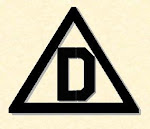_
I'm getting to the point in Exodus where God is laying out some ground rules - not just the Ten Commandments in chapter 20, but a number of more specific scenarios which help guide a man's conduct. It is, in a very real sense, a lawbook.
As Christians, we live with the wonderful promises that Christ gave us - and the freedom that He purchased for us with His blood. It is easy, with this in mind, to neglect the Old Testament, and especially the laws that God laid out for His people in those early days after His deliverance of His people from the Egyptian oppression. With our freedom through Christ, the ceremony that portions of the Old Testament lay out and describe are no longer required. But we must also remember, as Christ Himself said,
"Think not that I am come to destroy the law, or the prophets: I am not come to destroy, but to fulfil." - Matthew 5:17 (emphasis added)
and later in Scripture...
"If ye love me, keep my commandments." - John 14:15
What Christ did for us was to become the very completion of the law - the fulfillment of the requirement that blood cover the sins of man. He became the Sacrificial Lamb for all eternity, and thus freed us from the old law that required continued sacrifice. But the groundwork is still there, and the principles behind the law still remain, because Christ fulfilled the law, He did not abolish it. The Old Testament is what explains the New Testament, and our freedom therein – freedom to follow God and His commandments. There are untold thousands of words that could be said on this subject alone, so I won't dwell here, I'll get back to my main point about Exodus, but I had to make those qualifying remarks.
The commandments that God lays out in chapter 21 vary, and include punishments for intentional and accidental death, theft, and injury. Also addressed towards the end of the chapter are damages to another man's property. What stuck out to me in the list of these specific laws was a man’s duty to take responsibility for his actions, and make amends when his actions have caused harm.
"If an ox gore a man or a woman, that they die: then the ox shall be surely stoned, and his flesh shall not be eaten; but the owner of the ox shall be quit. But if the ox were wont to push with his horn in time past, and it hath been testified to his owner, and he hath not kept him in, but that he hath killed a man or a woman; the ox shall be stoned, and his owner also shall be put to death.” – Exodus 21:28-29
This particular passage is interesting because it goes a step further than most of the rest of the chapter, which mostly describes a man’s direct actions (such as fighting with another man, injuring him, and then being required to heal him and pay him for his lost day’s wages [Ref: Exodus 21:18-19]). Verses 28-29 submit that a man is responsible for his inactions as well, not just his direct actions. If a man’s ox is known to be viscious, and the man does not take proper precautions to restrain the beast, then when the ox ends up killing someone, the owner is also held responsible. He is responsible because he knew there was the potential for disaster and he did not take the proper steps to avoid such an incident.
The examples listed in Exodus 21 talk a lot about the price a man must pay, or the retribution he must make, for his actions. He must be held accountable. For everyone, but especially for believers, and even more so for us as men and as leaders, we must take responsibility for our actions, to include a failure to be proactive. We have to admit when we are wrong, pay the price for our mistake, and take measures to correct our mistakes. This generalization applies everywhere – work, church, and narrowing it down – home. A failure to lead and to guide our families when we know the disasterous outcome of such an inaction puts a father every bit at fault for the results. A father must be proactive in this endeavor, and not take a passive role in the guidance of his family. He will be held accountable.
It’s not always easy to admit a mistake – our human pride sees to that. But we must be humble enough to admit our fault, take responsibility for it, correct it, and strive to become what our families need – a Christ-like leader.
_


No comments:
Post a Comment
I'd love to get your feedback!